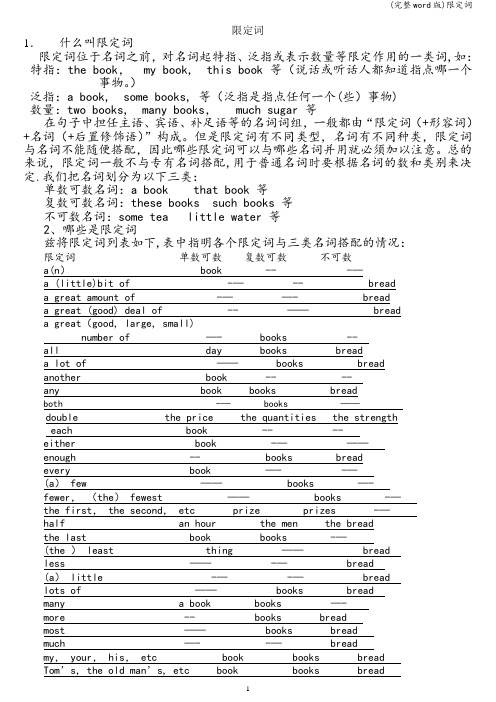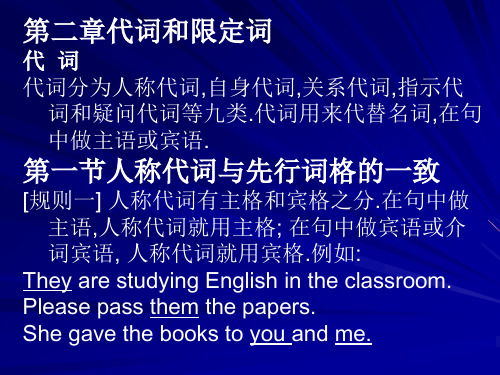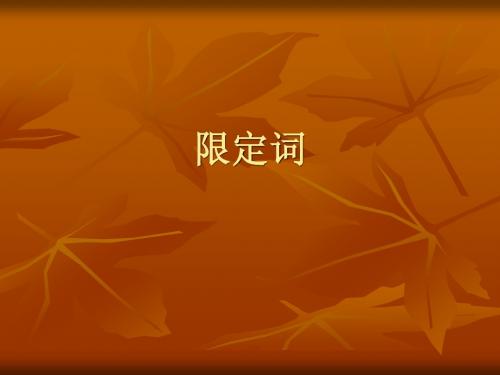限定词2
- 格式:docx
- 大小:20.50 KB
- 文档页数:5

限定词1.什么叫限定词限定词位于名词之前,对名词起特指、泛指或表示数量等限定作用的一类词,如:特指:the book, my book, this book 等(说话或听话人都知道指点哪一个事物。
)泛指:a book, some books, 等(泛指是指点任何一个(些)事物)数量:two books, many books, much sugar 等在句子中担任主语、宾语、补足语等的名词词组,一般都由“限定词(+形容词)+名词(+后置修饰语)”构成。
但是限定词有不同类型,名词有不同种类,限定词与名词不能随便搭配,因此哪些限定词可以与哪些名词并用就必须加以注意。
总的来说,限定词一般不与专有名词搭配,用于普通名词时要根据名词的数和类别来决定.我们把名词划分为以下三类:单数可数名词:a book that book 等复数可数名词:these books such books 等不可数名词:some tea little water 等2、哪些是限定词兹将限定词列表如下,表中指明各个限定词与三类名词搭配的情况:限定词单数可数复数可数不可数a(n) book -- -—a (little)bit of -— -- breada great amount of -——- breada great (good) deal of -- —— breada great(good, large, small)number of —- books --all day books breada lot of —— books breadanother book -- --any book books breadboth -— books ——double the price the quantities the strengtheach book -- --either book -———enough -- books breadevery book —- -—(a) few —— books —-fewer,(the) fewest —— books -—the first, the second, etc prize prizes -—half an hour the men the breadthe last book books -—(the ) least thing —— breadless —— -— bread(a) little -— -— breadlots of —— books breadmany a book books —-more -- books breadmost —— books breadmuch —- -— breadmy, your, his, etc book books breadTom’s, the old man’s, etc book books breadneither book -- --the next book books --no book books breadone book ———-one-third, two—fifths, etc (of)the book (of) the books the timeother student students breadthe other book books --plenty of —- books breadseveral -- books --some (某一)book books breadsuch book books breadthat book books breadthe book books breadthese -— books —-this book -— breadthose -- books ——twice, three times, etc the figure the quantities his strengthtwo, three, etc —- books --what(ever) book books breadwhich(ever) book books breadwhose book books breadzero(不用冠词或其它限定词) man men bread[注] 表内“-”表示有关限定词不能与该类名词搭配.限定词的搭配 1、概说名词词组中,当两个或两个以上的限定词同时出现时,限定词之间有一定的搭配关系,根据其不同的搭配位置可分为三类,其中最重要的一类是中位限定词,:Write your answer on every other line。

,.限制词( determiner)限制词是在名词词组中对名词中心词起特指、泛指、定量或不定量等限制作用的一类词。
一、英语限制词种类1.定冠 ,不定冠 ,零冠。
如: the, a2.名属格。
如:my friend ’s, Tom ’s⋯3.物主限制。
如 : my, your ⋯4.指示限制。
如: this, that, these,those, such ⋯5.疑限制。
如: what, whose, which⋯6.关系限制。
如: which, whose ⋯7.不定限制。
如: some, any, each, every, either, neither, all8.数 (基数、序数、倍数、分数 )9.量。
如: a lot of, lots of ,a great/good deal of ,a great/large/good number of⋯,.二、限制与三名的搭配关系限制按它意可分特指限制、泛指限制、定量限制、不定量限制四大。
四限制有的能与数、复数可数名搭配,也可与不行数名搭配1 )能与三名搭配的限制主要有:the; my, John’ s,the old man’ s⋯; some, any, no,all, other, such, what(ever), which (ever), whose⋯eg. the book----the books----the money,my book----my books----my moneyJohn ’ s book--- John’ s books---- John’s money2)能与数名搭配的限制。
如:a (n) , each, every, another,either ,one,neither, many a,such a (n)⋯eg. each worker , every student, either book , another book3)能与复数名搭配的限制。

限定词(二):数量限定词与个体限定词 数量限定词(一):a few, few/al ittle, little数量限定词(二):some/any个体限定词(一):each/every与名词的搭配关系肯定/否定之别与only或very的搭配关系从与名词的搭配来看,a few和few的后面只能接复数名词,而a little和little的后面只能接不可数名词。
例如:a few days, few boys ; a little water, little money从肯定及否定的角度来看,a few和a little的意思是肯定的,相当于s ome,表示“有一些”的意思。
而few和little的意思是否定的,表示“很少,几乎没有”。
只能说:only a little或only a few,而不能说:only few*或o nly little*。
但为了强调否定意义,我们可说:very few或v ery little。
与名词的搭配关系特殊用法一:any与单数名词搭配特殊用法二:some与单数名词搭配从与名词的搭配来看,some和any均可以与不可数名词及可数名词复数连用,表示“一些”。
s ome一般用在肯定句中,而any一般用在否定句中。
在疑问句中,我们多数情况下用any,但是在表示我们期待一个正面的回答或要鼓励对方说“是”时,要在疑问句中用some。
例如:Havey ou got any medicine to cure your cough?你吃治疗咳嗽的药了吗? Would you like tog ive me some advice?你想给我提点建议吗?当any的后面接单数名词时,它的意思是“无论哪一个,任何一个”,此时可用于任何类型的句子。
You can catch any bus. They all go to the railway station.你坐哪辆公共汽车都行,它们都到火车站。



专题三第三讲限定词(二)在英语中,限定词是在名词词组中对名词中心词起特指、泛指(冠词),表示确定数量(数词)和非确定数量(不定代词)等限定作用的词类.名词词组除有词汇意义外,还有其所指意义, 是特指(即指特写的对象〕,还是泛指(即泛指一类人或物〕;是有确定的数量,还是没有确定的数量.表示名词的非确定数量的不定限定词有(不定代词):n o, some, any, each, every, enough, either, neither, all, both, half, several, many, much, (a) few, (a) little, other, another 等.接下来我们分类一一讲解。
数量限定词(一): a few,few/a little,little(四个小不点)与名词的搭配关系: a few 和few 的后面只能接复数名词,而 a little 和little 的后面只能接不可数名词。
例如: a few days, few boys a little water, little money肯定/否定之别: a few 和a little 的意思是肯定的,相当于some,表示“有一些”的意思。
而few 和little 的意思是否定的,表示“很少,几乎没有”。
例如:His theory is rather difficult; few people understand it.=His theory is rather difficult; almost no people understand it. 他的理论很深奥,没什么人能够理解。
His theory is rather difficult, but a few people understand it. 他的理论很深奥,但有一些人能够理解。
Ihave little interest in English, so I am very poor at it. 我对英文没什么兴趣,所以学得很不好。
限定词的分类前位限定词1 不定限定词all,both,half2 表示倍数或分数的词double,twice,three times;one-third,two-thirds等3 指示限定词such(与不定冠词连用):与中位限定词a/an或后位限定词a lot of 等连用时4 疑问或连接限定词what(只用于感叹句中)5 不定限定词1 修饰复数可数名词(a) few of, many of, a good/great many of, a (great/large/good/small) number of, etc.2 修饰不可数名词a bit of, (a) little of, much of, a great/good deal of, a great amount of, etc.3 修饰复数可数名词与不可数名词most of, a lot of, lots of, plenty of, a quantity of, etc.上述不定量限定词只有后跟中位限定词the, my, his, her, your, etc., this, that, these, those时用作前位限定词中位限定词1 冠词a/an, the2 物主限定词my,your,his,her,its,our,your,their3 指示限定词this,that,these,those4 不定限定词1 通用限定词each,every2 肯定限定词some3 非肯定限定词any,either4 否定限定词no,neither5 量词限定词enough5 名词所有格——名词+-'s6 疑问限定词/连接限定词/关系限定词 what(ever),which(ever),whose,whosever后位限定词1 序数词 first,second,third,etc.2 通用序数词 last,next,additional,further,past,etc.3 基数词 one,two,three,etc.4 不定限定词1修饰复数可数名词(a)few (of), fewer, (the) fewest, many (of), several2修饰不可数名词(a) little (of), much (of)3修饰不可数名词和复数名词less, more(of),most(of)4修饰单数可数名词和不可数名词(the)least5修饰单、复数可数名词another,certain6 修饰单、复数可数名词及不可数名词other5 开放性量词1修饰复数可数名词a good/great many (of), a (great/large/good/small) number of, etc.2修饰不可数名词a bit of, a great/good deal of, a great amount of, etc.3修饰复数可数名词与不可数名词a lot of, lots of, plenty of, a quantity of, etc.6 指示限定词such(不与冠词连用)限定词与名词的搭配关系A 只修饰单数可数名词的限定词前位限定词what a;中位限定词a/an, each, every, either, neither;后位限定词many a, one, etc.B 只修饰复数可数名词的限定词前位限定词both后位限定词two,three,etc.,(a) few, fewer, (the) fewest, many, several, these, those.前位限定词或后位限定词a good/great many (of), a (great/good/small) number of, etc.C 只能与不可数名词连用的后位(或前位)限定词(a)bit of, a good deal of, a great deal of, a great amount of, (great/large) amounts of, (a) little (of), much (of) D 只与单数和复数可数名词连用的后位限定词first, second, third, etc., last, next, another, (a) certain, etc.E 只与不可数名词和复数可数名词连用的限定词中位限定词enough, 零冠词后位限定词less, more, most, a lot of, lots of, plenty of, a quantity ofF 只与单数可数名词及不可数名词连用的限定词中位限定词this, that后位限定词(the) leastG可与单、复数可数名词及不可数名词连用的限定词前位限定词all, half, double, twice, three times, one-third, two-thirds, such中位限定词the, my, your, etc., some, any, either, no, what(ever), which(ever), whose, whosever, 名词所有格后位限定词additional, further, past, other, such代词分类表。
限定词:限定词是在名词词组中对名词中心词起特指、类指以及表示确定数量和非确定数量等限定作用的词类。
名词词组除有词汇意义外,还有其所指意义,是特指(即指特写的对象),还是类指(即泛指一类人或物〕;是有确定的数量,还是没有确定的数量。
能在名词词组中表示这种所指意义的词类就是限定词。
基本简介1、冠词(article)定冠词(DEFINITE ARTICLE),不定冠词(INDEFINITE ARTICLE),零冠词(ZERO ARTICLE)2、形容词性的代词物主限定词(POSSESSIVE PRONOUN DETERMINER),my, your, his, her, our, your, their, one's, its.名词属格(GENITIVE NOUN),John's, my friend's.指示限定词(DEMONSTRATIVE DETERMINER),this, that, these, those, such.关系限定词(RELATIVE DETERMINER),whose, which.疑问限定词(INTERROGATIVE DETERMINER),what, which, whose.不定限定词(INDEFINITE DETERMINER),no, some, any, each, every, enough, either, neither, all, both, half, several, many, much, (a) few, (a) little, other, another.3、数词(numeral)基数词(CARDINAL NUMERAL) 和序数词(ORDINAL NUMERAL)倍数词(MULTIPLICATIVE NUMERAL) 和分数词(FRACTIONAL NUMERAL)4、量词(QUANTIFIER) a lot of, lots of, plenty of, a great of, a good deal of,a large of, a small amount of, a quantity of, a great of, a good n umber of等。
Le déterminatif (II)I.Les adjectifs possessifsFormes : me, te, se...Emploi :Je vais aller au cinéma avec mes amis.C’est Nicole et son mari Pascal.Le père le prend à la main. ( à la = à sa main).Elle le saisit au collet.Ce col est très étroit, ça me gêne le cou.Attention : Elle ouvre ses yeux immenses.pronom indéfini ou impersonnel : on, personne, chacun, nul, il fait...Chacun son goût.On a sa fierté.Il faut laver son linge sale en famille.Nul n’est satisfait de son état.Il est bon de connaître ses limites.Exprimer une habitudeIl gagane ses 2000 euros par mois.Il travaille ses dix heures par jours.II.Les adjectifs démonstratifs.Formes : ce, cet, cette, ces✧= quel, pour exprimer une surprise ou une haineTu demandes pourquoi je viens ? Cette demande !Il veut que je vienne. Cette idée !Formes : ce...-ci, ce...-là ...Je prefère cette voiture-ci à cette automobile-là.✧Ces huîtres-là ne sont pas fraîches.III.Les adjectifs interrogatifs et exclamatifsFormes : quel, quelle, quels, quellesQuelles langues parlez-vous ?Quel feuilleton avez-vous vu cette semaine ?Quel est l’impact de ces nouveaux médias sur la façon de s’informer ?Attention : vrai ou faux – Quelle chose avez-vous, M. Martin ?Exclamatifs :Quelle joli jardin !Quelle est votre erreur !Quel plaisir de te voir !IV.L es adjectifs indéfinis和ne一起,省略句中在介词sans或连词sans que后,表“没有一个...”Aucune femme n’est indifférentes à sa beauté physique.Quel que soit le lieu de votre stage, vous ne toucherez aucune rémunération.Avez-vous reçu des nouvelles de votre père ? --- Aucune, ces temps-ci.La numérisation permet de traiter, de stocker et de transmettre les données plus facilement etplus rapidement, sans aucune déperditi on d’information.Nulle chose ne manque.Il n’y a pas un roman dans sa bibliothèque.Attention : Vrai ou faux :Il ne lira plus aucun roman policier.Il n’a pas aucun ami.2.Quelque,单数:表示“某一个”或“某些,少许”;复数:表示“几个”或“若干”等J’ai quelque part une maison très grande.Il avait des talents, quelque savoir.Cette affaire souffre quelque difficulté.J’ai quelques amis au Canada.Attention : Il a quelque cinquante ans.Quelque 1000 innovations techniques ont être introduites.3.Chaque ,表示“每”Chaque membre de la classe donna son avis.Il va au Zhejiang chaque samedi.Attention : comment dire 每两天(两个小时) en français ??4.Touttout(toute) + nTout homme nâit et meurt.Toute jeune fille a rêvé du Prince Charmant.tous(toutes) + nIl est parti et a cessé toutes relations.en tout/tous pays, à tout/tous moment/momentstout(toute)+déterminatif +nIl a plu toute la nuit.Ce n’est pas la peine de nous presser, nous avons tout notre temps.Comment, tu as déjà dépensé tout ton argent ?tous (toutes) + déterminatif +nCe journaliste a recuilli toutes les informations nécessaires à la rédaction de son article.Pour cette soirée, vous viendrez tous les quatre ?tous (toutes) + les + n. exprimant l’heure ou l’unitéVous avez un train toutes les heures.Tous les matins, j’accompagne mes enfants à l’école.Les députés du parlement sont élus tous les cinq ans.tout + n. auteur/villelire tout Maupassanttout Wuhantout, tous, toutes + pronom démonstratifTout ce, toute cela, tout ça :✓Donnez-moi tout ce qu’il y a de mieux.✓Tout ça ne me regarde pas.✓Sa mère connaît déjà tout cela.Tous ceux, toutes celles :✓Il n’y a plus beaucoup de places pour le concert de ce soir. Toutes celles qui restent sont au dernier rang.Attention : tout...ne... pasComment traduire les phrases suivantes en chinois :✓Tous les élèves ne sont pas venus.✓Toute vérité n’est pas bonne à dire.✓Je ne sais pas toutes les langues étrangères.5.même,名词前,表示“同样的”,“相同的“;名词后,表示”自己“,”本身“。
Regarde comme ils se ressemblent : ils ont les mêmes yeux.Attention : 和...一样的 = même ... que... OU même... avec... ?Il fait la même température avec hier. OU Il fait la même température qu’hier.Les directeurs sont venus eux-mêmes.Les Romains vainquirent les Grecs par les Grecs mêmes.Remarque : même comme adverbe✧Alors tout le monde est venu, même Pascal ?✧Venez, même si vous devez partir tôt, ça me fera plaisir de vous voir.6.plusieurs 表示比二大的一个不确定的数字,意思为“几个“,”好几个“Cela fait plusieurs jours que je n’ai pas de nouvelles de Jean. Qu’est-ce qu’il devient ?7.différents, divers ,许多,好些,可指人或物Différentes personnes me l’ont dit.Divers ouvrages traitent de la question.8.certain表不确定,意思为“某一(几)个“Il est venu nous voir avec un certain cousin à lui.Certain jour qu’il pleuvrait, j’étais sorti sans imperméable.9.telun (une) tel (telle), de tels(tells)Comment veux-tu qu’on retrouve quelque chose ici, il y a un tel désordre.Je suis étonné qu’il tienne de tels avis.=certain, sans articleJ’arriverai tel jour, à telle heure, sans telle ville.10.autreDonnez-moi un autre stylo, celui-là ne marche pas.J’ai perdu mes clés, sauf d’entrer par la fenêtre, je ne vois pas d’autre moyen.d’un côté... de l’autre côté11.quelconqueSi, pour une raison quelconque, vous ne pouvez pas venir, prévenez-nous à temps.✧je ne sais quel+n./je ne sais qui/où/pourquoi/combien de/quand etc.Pour parfumer ce gâteau, il faut ajouter je ne sais quelles épices.Il y a je ne sais combien de temps.Il est sorti avec je ne sais qui.Notre départ est décallé à je ne sais quand.Il passe ses nuits je ne sais où.✧n’importe q uel + n.Il veut acheter une villa au bord de la mer à n’importe quel prix.Je me sens capable de surmonter n’importe quelle difficulté.✧n’importe qui/quoi/lequel/comment/quand/oùRassurez-vous, je ne parle du projet à n’importe qui.N’importe lequel d’entre nous.I veut réussir n’importe comment.Venez n’importe quand, je suis chez moi cette semaine.Elle dit n’importe quoi.。